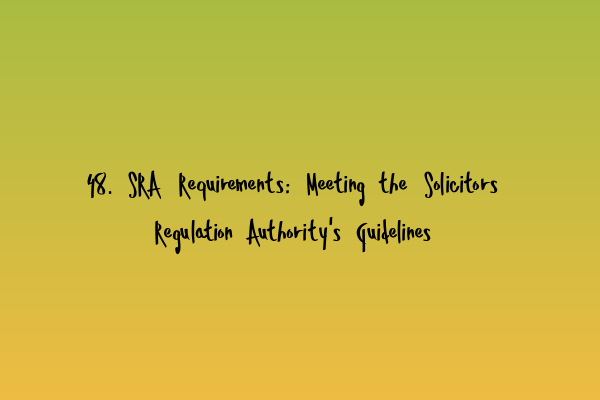48. SRA Requirements: Meeting the Solicitors Regulation Authority’s Guidelines
Aspiring solicitors preparing for the Solicitors Qualifying Examination (SQE) must not only study and revise for the exam but also familiarize themselves with the guidelines and requirements set by the Solicitors Regulation Authority (SRA). The SRA is the regulatory body responsible for overseeing the education, training, and professional conduct of solicitors in England and Wales. Compliance with their guidelines is essential for a successful legal career. In this article, we will discuss key SRA requirements and how to meet them effectively.
1. Adhering to the SRA Principles
The SRA Principles form the foundation of ethical and professional behavior for solicitors. These principles guide solicitors in their conduct, ensuring they promote the rule of law, act with integrity, maintain confidentiality, and more. Aspiring solicitors must thoroughly understand and internalize these principles to exhibit proper professional conduct throughout their legal careers.
Related Article: Focus Areas in SQE1 and SQE2: Mastering Key Concepts
2. Meeting the Competence Statement
The SRA Competence Statement outlines the skills, knowledge, and behaviors that solicitors must possess to provide competent legal services. This statement covers various areas, including legal research, analysis, drafting, negotiation, advocacy, and more. Aspiring solicitors must ensure they acquire and demonstrate these competencies during their training and throughout the SQE exams.
3. Undertaking Qualifying Work Experience (QWE)
Completing Qualifying Work Experience (QWE) is an essential requirement for becoming a solicitor. QWE allows aspiring solicitors to gain practical legal experience, develop their skills, and apply their knowledge in real-world situations. It is crucial to carefully select appropriate QWE placements to ensure the experience aligns with the SRA’s requirements and provides a diverse range of legal work opportunities.
Related Article: SQE Sample Papers: Practice for Exam Success
4. Complying with the Continuing Professional Development (CPD) requirements
Once qualified as a solicitor, professionals must remain up-to-date with legal developments, enhance their skills, and maintain their competence. The SRA requires solicitors to undertake Continuing Professional Development (CPD) activities regularly. As an aspiring solicitor, it’s crucial to recognize the importance of ongoing learning and skill development throughout your legal career.
5. Understanding Anti-Money Laundering (AML) Regulations
Money laundering poses a significant risk to the legal profession, and solicitors must play their part in preventing it. The SRA has strict guidelines regarding Anti-Money Laundering (AML) measures, which all legal professionals must follow. As a future solicitor, it is vital to familiarize yourself with these regulations and implement necessary procedures to detect and prevent money laundering within your practice.
6. Upholding Professional Ethics and Conduct
Professional ethics and conduct form a fundamental aspect of being a solicitor. The SRA expects aspiring solicitors to demonstrate high ethical standards, maintain client confidentiality, and adhere to the SRA Code of Conduct. Understanding and applying the principles of professional ethics is crucial for building trust with clients and ensuring a successful legal career.
Related Article: Conquer the Multiple Choice Questions (MCQ) in SQE1
Conclusion
Meeting the guidelines set by the Solicitors Regulation Authority is essential for aspiring solicitors to establish themselves as competent and ethical legal professionals. By adhering to the SRA Principles, fulfilling the Competence Statement requirements, completing qualifying work experience, complying with CPD obligations, understanding AML regulations, and upholding professional ethics and conduct, future solicitors can build a solid foundation for their legal careers.
Related Articles:
